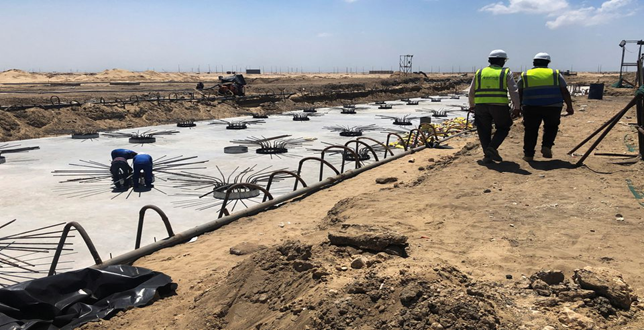
Egypt’s non-oil private sector remained deep in contraction in October, the 23rd straight month of decline, a survey showed on Thursday.
The S&P Global Egypt Purchasing Managers’ Index (PMI) stood at 47.7, its highest since February and slightly up from September’s 47.6, but still below the 50.0 threshold that separates growth from contraction, reported Reuters.
Business optimism among non-oil firms sank to its lowest in more than a decade, with just 4% of firms giving a positive outlook for the next 12 months.
Non-oil sector firms reduced staffing numbers for the first time since June, some of them saying deteriorating sales triggered the layoffs.
“Egypt remains heavily impacted by the war in Ukraine, particularly in the tourism sector, as well as industries constricted by the government’s import ban in place since March in a bid to conserve US dollar reserves,” said S&P Global economist David Owen.
On 3 November 2022, S&P Global released its monthly report on Egypt’s Purchasing Managers’ Index (PMI), highlighting that “Business sentiment hits record low as price pressures continue to dampen activity,” with Key findings as:
– Expectations for future output down to lowest on record
– New business declines further as inflation remains severe
– Purchasing continues to fall markedly amid import controls
The report proceeds to state that: business optimism among non-oil firms slid to its lowest in over a decade of survey data in October, according to the Egypt PMI, as only 4% of firms gave a positive outlook for the next 12 months. Rising prices, supply problems and weak global demand also served to drive new business and activity lower.
Meanwhile, the headline seasonally adjusted S&P Global Egypt Purchasing Managers’ Index (PMITH) – a composite gauge designed to give a single-figure snapshot of operating conditions in the non-oil private sector economy-posted at 47.7 in October, from 47.6 in September, stretching the current sequence of deterioration to just under two years.
Despite ticking up to the highest since February, the headline index was still below its long-run average and indicated another solid decline in operating conditions.
The fall was accompanied by a sustained decrease in new business inflows, which dropped solidly though to the least extent for eight months. Firms suffering a contraction in new orders often highlighted rapid inflationary pressures and a subsequent fall in client spending, including customers from foreign markets.
As a result, overall activity decreased at a sharp pace in October, with the downturn broadly spread across the whole of the non-oil economy. Sector data showed that output decreased in manufacturing, construction, wholesale & retail and services, with new business also falling in each category.
Anecdotal evidence indicated that ongoing controls on imports added to economic disruption in October. Introduced in the wake of the Russia-Ukraine war to limit losses of foreign currency reserves, import suspensions meant that a number of businesses again struggled to acquire relevant inputs. The shortfall contributed to the drop in output and another marked contraction in purchasing activity, although to a lesser extent than in September. Firms noted that higher prices for raw materials and a lack of new orders also weighed on buying activity.
Indeed, survey data has indicated severe cost pressures in recent months, reaching a near four-year high in June.
Despite softening for the third time in four months, the rate of input cost inflation was still sharp and above the series trend in October, with nearly a quarter of respondents seeing prices rise over the month often due to higher purchasing costs.
In turn, rising purchase prices were commonly linked to a lack of raw material availability and a further deterioration in the exchange rate against the US dollar which pushed input costs higher.
While output charges also increased, they did so at a much softer rate than seen for input costs, with just 5% of companies noting a rise. The weaker uptick suggested that softening demand had partly offset efforts to keep charges in line with expenses.
Elsewhere, survey data signalled a first improvement in suppliers’ delivery times for exactly a year, in a sign that conditions were stabilising following the impact of the Russia-Ukraine war.
The improvement supported a fresh uptick in stocks of purchases, although this was partly linked to lower output requirements.
With output expectations hitting a record low, non-oil firms reduced their staffing numbers for the first time since June, although only marginally, with some companies citing layoffs due to deteriorating sales.
In his comment on this, David Owen, Economist Intelligence, said: Egyptian non-oil activity sunk lower in October according to the latest PMI data, as inflation continued to weigh on consumer sales and business spending.
Despite the drop in soles easing to the weakest since February, firms signalled that the deteriorating local and global economic environment was likely to hurt the non-oil sector even further, with business optimism regarding the next 12 months sliding to its lowest in the series history.
Egypt remains heavily impacted by the war in Ukraine, particularly in the tourism sector, as well as industries constricted by the government’s import ban in place since March in a bid to conserve US dollar reserves.
Several businesses reported that import restrictions had pushed material prices even higher, adding to upticks in energy and food commodity prices recorded since the war began.
“However, survey data suggests that only a proportion of cost rises are being passed through to consumers – only 5% of respondents raised their charges in October, compared to 24% that saw a concurrent rise in costs-suggesting that many firms are being forced to shoulder the burden of higher expenses as the demand outlook weakens,” David Owen concluded.



